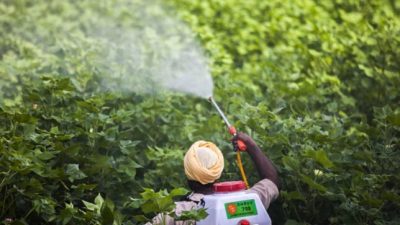Indian Government Restricts Use of Glyphosate in Massive Blow to Agrichemical Lobby

All Global Research articles can be read in 51 languages by activating the Translate Website button below the author’s name.
To receive Global Research’s Daily Newsletter (selected articles), click here.
Follow us on Instagram and Twitter and subscribe to our Telegram Channel. Feel free to repost and share widely Global Research articles.
***
The Indian government has restricted the use of glyphosate-based herbicides due to the risks to human and animal health. On Tuesday the Agricultural Ministry stated in a notification that “the use of glyphosate is prohibited and no person, except Pest Control Operators (PCOs), shall use glyphosate.”
The government statement added that all agrichemical companies have been asked to return the certificate of registration granted for glyphosate and its derivatives to the registration committee so that the warning in capital letters can be incorporated on labels and leaflets. Permission will only be given for glyphosate formulations through PCOs. The companies have been given three months to return the certificate, otherwise strict action will be taken as per the provisions of the Insecticides Act, 1968.
The final notification restricting the use of glyphosate across India comes two years after the Agricultural Ministry issued a draft notification on July 2, 2020. The draft was released following a decision by the Kerala government to ban the distribution, sale and use of the world’s most used weed killer.
Kerala, Punjab, Telangana and Andhra Pradesh are among the major agriculturally important states that have banned the use of glyphosate citing its adverse impact on human health, according to Business Standard.
The main points of the Indian government notification are:
- No person shall use Glyphosate except through Pest Control Operators.
- All the holders of certificate of registration granted for Glyphosate and its derivatives shall return the certificate of registration to the Registration Committee for incorporation of the warning in bold letters “THE USE OF GLYPHOSATE FORMULATION TO BE ALLOWED THROUGH PEST CONTROL OPERATORS (PCOs)” on the label and leaflets.
- If any person who holds the certificate of registration fails to return the certificate to the Registration Committee, referred to in clause (3), within a period of three months, action shall be taken under the provisions contained in the said Act.
- Every State Government shall take all such steps under the provisions of the said Act and the rules framed thereunder, as it considers necessary for the execution of this Order in the State.
The move to restrict glyphosate is likely partly aimed at controlling the spread of illegal herbicide tolerant (HT) cotton, which more farmers in some regions of India have been caught planting in the past few years.
There are very few Pest Control Operators in rural areas of India, so the draft order is seen as an attempt by the Indian government to stop the use of glyphosate using a regulation that makes it almost impossible for farmers to spray glyphosate.
*
Note to readers: Please click the share buttons above. Follow us on Instagram and Twitter and subscribe to our Telegram Channel. Feel free to repost and share widely Global Research articles.
Featured image is from Sustainable Pulse

